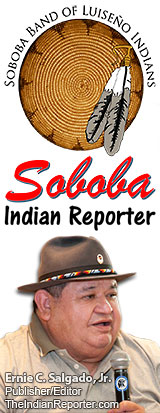 |



| ABOUT TIR, HISTORY & MISSION STATEMENT
MEDIA RESEARCH LIBRARY PUBLISHING CORNER CALIF INDIAN COMMUNITY TIR WEB SITE |
Soboba Teen Traces D-Day Steps of Great Grandfather
Corryn (Salgado) Flores, a Soboba teenager, wrote an essay when she was a 13 year old exploring the irony of her great-grandfather's service during World War II even though he was not born an American citizen and her subsequent trip to Normandy, France this summer and the site of the D-Day battleground where her great-grandfather, Ernest Salgado, Sr. landed on Omaha Beach, Normandy with the invasion forces on June 6, 1944. And ironically the same day his youngest son Richard was born. Corryn's essay recounted the irony of her 88-year-old great-grandfather being born on October 16, 1920 four years before citizenship was granted to American Indians in 1924. Before that, American Indians only had the right to apply for citizenship, and even that right was granted years after the Fourteenth Amendment to the United States Constitution intended to secure full citizenship rights of former slaves, but didn’t include American Indians. It was proposed on June 13, 1866, and ratified on July 9, 1868. Corryn said her education began when she was required to write an essay for the American Legion's annual contest when she was an eighth grader at St. Hyacinth Academy in San Jacinto. The essay was judged as the winner of the contest along with letters of congratulation from Sen. Barbara Boxer and Rep. Jerry Lewis and a cash prize. This year, she was selected as a People to People International student ambassador through a rigorous qualifying program that included interviews, an essay, and monthly meetings. “The effort was worth it,” she said, “because it gave me the opportunity to walk the sand at Omaha Beach, where her great-grandfather was among the D-Day landing forces, and to stand on the cliffs overlooking the beaches of Normandy.” Her and the other students viewed the wreckage of battle left where it was as a way of remembering the sacrifices made there, and even crawled through the same narrow bunker passageways used by those long-ago soldiers. Post Commander, Robert L. Sigala of Post 848 said the legionnaires decided to honor Ernest Salgado Sr. for his wartime service in part because of his great-granddaughter, Corryn Flores, now 15. Mr. Salgado was honored with a dinner, attended by about 80 family members and legionnaires and members of their families, and he was presented with an award for his service. In addition to his service on Normandy Mr. Salgado participated in four other major campaigns through out Europe. He was also awarded a Bronze Star Medal, Combat Infantryman Badge along with other Campaign Medals. “We have a tendency to forget there are people in harm's way around the world,” Sigala said, as well as the contributions made by those who wore the uniform before them. The experience, she said, gave her an appreciation for the contributions of the soldiers that most people know only from history books. “We never get credit for anything we've done,” Corryn said of American Indians. “Native Americans have only been recognized for the bad things we've done.” Corryn and her parents, Becky and Chris Flores, live on the Soboba Indian Reservation, where Salgado's son, Robert Salgado Sr., has been the Soboba tribal chairman for many years and his youngest daughter Rose also serves on the Tribal Council as well. His other two son’s Ernie Jr. and Richard are also veterans. “I am proud of all of them,” said Becky Flores, granddaughter of Ernest Salgado Sr. “I think we take our soldiers for granted.” She recalls few conversations with her grandfather's about his service when she was growing up. “Grandpa didn't talk much about his activities in the war,” she said. “The things you had to do to survive are not something you share at the dinner table.” Sigala said time is running out to honor those who fought off the Japanese and German threats during World War II. “We're losing about 1,500 veterans a month,” he said. “They don't teach their history much any more.” Corryn gave her great-grandfather a copy of the essay, which he hung on his wall, and, when she got back from her two-week trip to Europe, presented him a collage of photos of the way the old battlegrounds look today. When Corryn returned from her two-week trip to Europe she gave her great-grandfather a collection of photos of the way Omaha Beach looks today. She also gave her him a copy of the essay, which he hung on his living room wall.
|
CALIF INDIAN NETWORK: AHMIUM.org | SCAIR.org | SDICENTER.org | APAPAS.com | CALIE.org | THEINDIANREPORTER.COM
—
WEB SITE DESIGN
www.theindianreporter.com COPYRIGHT 2009-Present • ALL RIGHTS RESERVED
